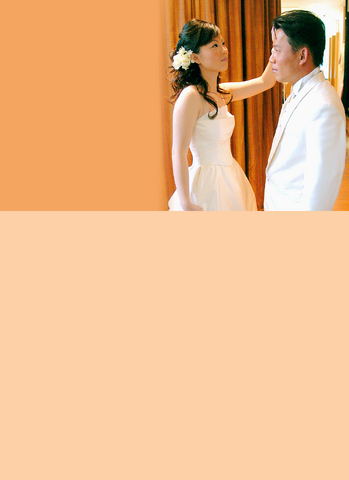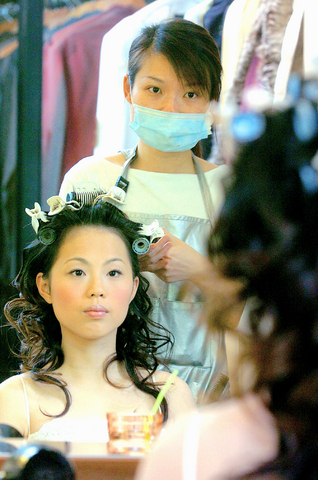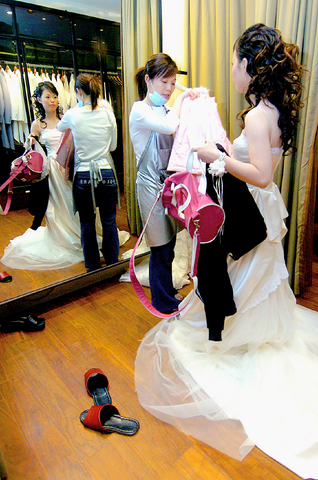Stroll down Taipei's Zhongshan North Road or Aiguo East Road and you'll notice a soon-to-be-wedded couple decked out in glitzy attire posing in a simulated loving embrace, while a photographer hurriedly juggles lenses and a harried assistant arranges reflectors.
It might seem inane, but posing for photos roadside as the traffic roars past spewing exhaust fumes is a fashionable pre-marriage ceremony must for any bride and groom looking to impress their family and friends. As any bride will tell you, a visit to the wedding salon is as important a part of the marriage ritual as the actual wedding banquet.
"It's important because it gives you something to remember and no wedding ceremony is complete without the photos," said Chiu Yi-hsuan (

everyday."
The salons first began to appear in the mid-1970s. And while the reason behind their sudden emergence has long been forgotten, it is widely accepted that their popularity grew out of Taiwan's love affair with convenience.
"Before the establishment of the salons soon-to-be-married couples had a hell of a time organizing their pre-wedding rituals. They had to go the tailors, go to the dress store, go to the photo studio and go to the beauty parlor," said Tseng Yin-huan (

Since the initial days of the wedding salon, the task of transforming the plainest Jane into a striking movie star for a day has ballooned into a billion-dollar business.
Along with taking photos the salons rent and sell wedding dresses or suits, and employ hairdressers and beauticians, who ensure the bride's appearance on her special day is befitting of such a grand occasion. And, if asked, they can even help organize the wedding reception.
In any given month, Taipei's famous eye-catching wedding salons, with their huge glass facades awash with silken wedding gowns and fairytale photographs of happy, loving men and women service an average of between 150 to 300 couples. Last year an estimated 250,000 couples chose to tie the knot and, according to Tseng, at least 80 percent of those opted for the wedding salon treatment.

PHOTO: SEAN CHAO TAIPEI TIMES
Many of these chose to visit Taipei's famous wedding salons on Zhongshan North Road. The 30 salons that sit astride the city's central north-south thoroughfare have been at the center of the wedding salon industry since its first began and as such enjoy a steady flow of pre-wedding traffic throughout the year.
"Sure, SARS put a bit of damper on business two years ago, but apart from that we get a steady flow of business all year round," said photographer and salon proprietor Lin Chang-ru (
While wedding salon proprietors are loathe to give actual figures for their annual takings, estimates point to the annual revenues of Taipei's leading salons reaching more than NT$50 million per annum. On a national level the total annual revenue of the nations' wedding salons is estimated to be in the region of well over NT$2 billion.
An average couple spends at least NT$50,000 on a basic package which includes photos, clothing rental and cosmetology. More affluent couples, however, may choose to spend as much as NT$200,000. A majority of those who choose to visit wedding salons are aged from between 25 to 35 and are getting married for the first time.
Older couples and those getting married for a second time are, according Li Tze-chun (
"We get few couples over the age of 40 and even fewer couples who have been married before coming here," said Li. "I think it's a matter of money. Younger couples don't seem to mind spending money on lots of photos and so on, but older couples have more of a desire to save money. The older couples that come here are more inclined to purchase the less expensive packages."
Regardless of how much money each couple chooses to spend it is, and some might say predictably so, more often than not the woman who wears the trousers when it comes to organizing a day at the wedding salon.
"It wasn't my idea. If it was up to us [men] we'd take a camera into the garden and take a few shots," said Andrew Ings who was subjected to a day at the wedding salon 11 years ago. "It is an arduous affair. Take the pain of an all-day shopping trip with the wife and kids and imagine doing that wearing Mickey Mouse outfits."
Ings' recollections of his painful wedding salon experience may seem a bit over the top but, according to Li, men are noticeably the least willing parties when it comes to posing for pre-wedding photos and going through the rigmarole of changing into four of five different sets of clothing.
"Men are a bit shy to begin with, but after a while they usually warm to the idea of dressing up and posing for photos," said Li. "I have never seen an argument take place, but you can tell from the expression on the grooms' faces that they are not really enjoying the experience as much as their future wives."
Along with providing the couples with studio and roadside photo shoots, Taipei's salons also chauffeur customers to more picturesque locales. The most popular spots for couples in the Taipei area are Yangmingshan, Dansui and Keelung.
Once bastions of man-woman relationships, the wedding salons have adapted to deal with changing social views in recent years and now regularly cater to gay couples. The registry offices and the government may not yet formally recognize gay weddings, but salons such as Lin's are only too happy to help gay couples enjoy the same pre-wedding experiences as their heterosexual peers.
"It might have been frowned upon five or six years ago, but we now see half-a-dozen or so gay couples coming here every year," said Lin. "The law might not recognize their marriages, but when they come here they want the same treatment as non-gay couples. We are more than happy to provide them with photos, clothes and make-up."
It's not only gay couples that are looking to Taiwan's wedding salons for pre-wedding assistance -- the popularity of the salons is spreading overseas.
According to an employee of the Beautiful Marry Woman (
(
"Over the past three or four years Taiwan's wedding salons have become really popular with young Hong Kong couples looking to save money," said Lin "It's only an hour away, so there's hardly any traveling time involved. The couples get to have the photos taken, choose dresses and get a holiday at the same time. It's good for both parties, us and them."
While a majority of clients who visit Li's salon are still from Taiwan, she too has noticed a marked increase in the number of Hong Kong couples opting to travel to Taiwan in order to make pre-wedding preparations. She believes that the reason behind this recent trend is a matter of finances.
"Obviously a major factor is the cost. There are a handful of salons in Hong Kong, but they charge at least double those of Taiwan. A basic photo shoot would cost about the equivalent of NT$80,000 in Hong Kong dollars," she said. "It's really not surprising that so many Hong Kong couples choose to come here."
Of course, regardless of sexual or-ientation or where the couple hails from, what happens to the framed celluloid memories of the couple's happy day at the wedding salon after the wedding ceremony is another matter entirely. Though there are couples that choose to hang the huge framed prints on their living room walls most photos end up much like Chiu's.
"Ours are in a box," she said with a smirk. "They've been collecting dust sinc since the day after we got married."

In the March 9 edition of the Taipei Times a piece by Ninon Godefroy ran with the headine “The quiet, gentle rhythm of Taiwan.” It started with the line “Taiwan is a small, humble place. There is no Eiffel Tower, no pyramids — no singular attraction that draws the world’s attention.” I laughed out loud at that. This was out of no disrespect for the author or the piece, which made some interesting analogies and good points about how both Din Tai Fung’s and Taiwan Semiconductor Manufacturing Co’s (TSMC, 台積電) meticulous attention to detail and quality are not quite up to

April 21 to April 27 Hsieh Er’s (謝娥) political fortunes were rising fast after she got out of jail and joined the Chinese Nationalist Party (KMT) in December 1945. Not only did she hold key positions in various committees, she was elected the only woman on the Taipei City Council and headed to Nanjing in 1946 as the sole Taiwanese female representative to the National Constituent Assembly. With the support of first lady Soong May-ling (宋美齡), she started the Taipei Women’s Association and Taiwan Provincial Women’s Association, where she

It is one of the more remarkable facts of Taiwan history that it was never occupied or claimed by any of the numerous kingdoms of southern China — Han or otherwise — that lay just across the water from it. None of their brilliant ministers ever discovered that Taiwan was a “core interest” of the state whose annexation was “inevitable.” As Paul Kua notes in an excellent monograph laying out how the Portuguese gave Taiwan the name “Formosa,” the first Europeans to express an interest in occupying Taiwan were the Spanish. Tonio Andrade in his seminal work, How Taiwan Became Chinese,

Mongolian influencer Anudari Daarya looks effortlessly glamorous and carefree in her social media posts — but the classically trained pianist’s road to acceptance as a transgender artist has been anything but easy. She is one of a growing number of Mongolian LGBTQ youth challenging stereotypes and fighting for acceptance through media representation in the socially conservative country. LGBTQ Mongolians often hide their identities from their employers and colleagues for fear of discrimination, with a survey by the non-profit LGBT Centre Mongolia showing that only 20 percent of people felt comfortable coming out at work. Daarya, 25, said she has faced discrimination since she